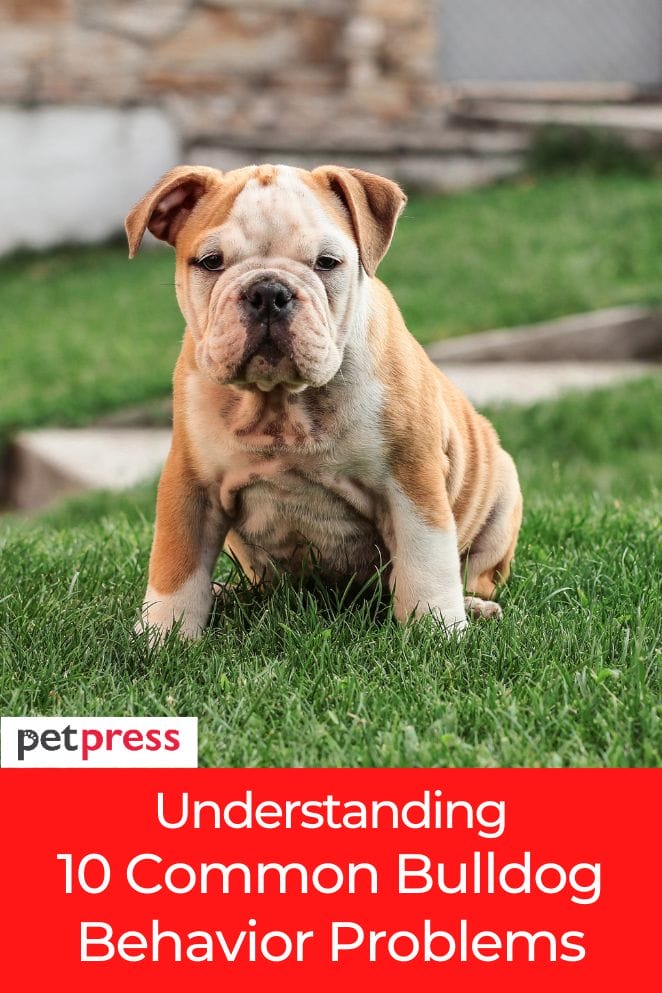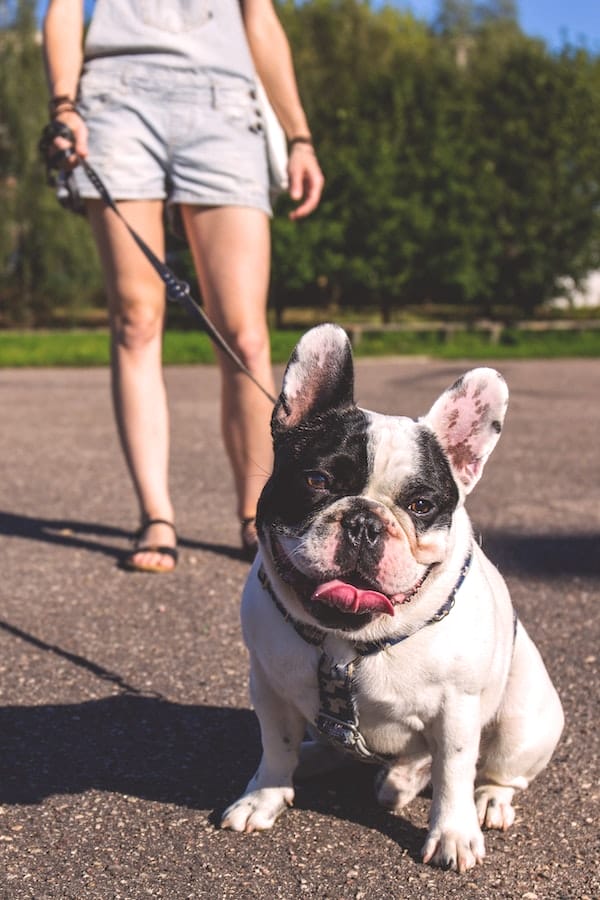
Welcome to our guide on understanding and addressing Bulldog behavior problems.
Bulldogs are beloved companions known for their distinctive appearance and charming personalities.
However, like any breed, Bulldogs can exhibit certain behavioral issues that may require attention and understanding.
In this article, we’ll explore Bulldog breed characteristics, common behavior problems they may face, the root causes behind these issues, and provide valuable tips for addressing them effectively.
Bulldog Breed Characteristics
Bulldogs are a truly distinctive breed, easily recognizable by their unique set of characteristics that set them apart from other dogs.
Physical characteristics
Bulldogs have a compact and muscular body, which makes them appear stocky and robust.
Their short, smooth coat comes in various colors, including brindle, white, fawn, or a combination of these.
One of their most defining features is their wrinkled face, which adds character and charm to their overall appearance.
Their loose skin, especially around the neck and shoulders, gives them a distinctive look.
Temperament
Despite their intimidating appearance, Bulldogs are known for their gentle and affectionate nature.
They are renowned for their loyalty to their families and are often described as “sensitive” souls.
Bulldogs are particularly good with children, making them excellent family pets.
They tend to form strong bonds with their human companions and enjoy being part of family activities.

Common Bulldog Behavior Problems
Bulldogs, despite their gentle and affectionate nature, can indeed exhibit certain behavioral traits that might require special attention and training. These include:
Excessive aggression
Bulldogs, like any other breed, can display aggression at times.
This aggression may stem from fear, territorial instincts, or a lack of socialization.
Proper early socialization and positive reinforcement training are crucial to mitigate aggressive tendencies.
Addressing the underlying causes and providing a safe, structured environment can help Bulldogs overcome their aggressive tendencies.
Separation anxiety
Bulldogs are renowned for their strong attachment to their owners, which can lead to separation anxiety when left alone. This anxiety can result in destructive behavior or excessive barking.
To combat separation anxiety, gradually acclimating Bulldogs to short periods of alone time, providing mental stimulation, and ensuring they have a comfortable space can help alleviate their distress.
Excessive barking
Bulldogs are not the quietest of breeds, and their distinctive gruff voice can lead to excessive barking if not properly managed.
Understanding the triggers for their barking, such as boredom or the need for attention, can help address this issue.
Consistent training and teaching the “quiet” command can be effective in curbing their vocal tendencies.
Stubbornness
Bulldogs are known for their stubborn streaks, which can indeed make training more challenging.
Their strong-willed nature requires a patient and consistent approach.
Positive reinforcement methods, using rewards and praise, often work best with Bulldogs.
Consistency and repetition are key to breaking through their stubbornness and achieving successful training outcomes.
Overheating
One of the most critical concerns for Bulldogs is their susceptibility to overheating due to their short snouts.
Bulldogs struggle to regulate their body temperature efficiently, which can lead to discomfort and agitation.
To prevent overheating, owners should be cautious when exercising them in hot weather, provide shade and cool water, and avoid strenuous activities during peak temperatures.
It’s also advisable to keep them indoors in extreme heat.

Chewing
Bulldogs, especially during their puppy phase, have an innate tendency to chew.
This behavior serves several purposes, including teething relief and mental stimulation.
However, if not properly channeled, it can result in damage to furniture and belongings.
To address this, providing a variety of dog-safe chew toys and consistent redirection can help Bulldogs satisfy their chewing instincts without causing destruction.
Jumping up on people
Bulldogs are known for their affectionate nature, and they often express their excitement by jumping up on people to greet them.
While this behavior might be endearing in small puppies, it can become problematic, annoying, or even dangerous as they grow due to their stocky build.
Teaching them alternative greetings like sitting or offering a paw, combined with positive reinforcement, can curb this behavior and keep both your Bulldog and guests safe.
Pulling on the leash
Bulldogs, despite their sturdy and somewhat slow-paced appearance, can surprise owners with their strength when they pull on the leash during walks.
This behavior can make walks unpleasant and challenging.
Using a harness designed to discourage pulling and engaging in consistent leash training can make outings more enjoyable for both you and your Bulldog, promoting better leash manners.
Clinginess
Bulldogs are known for their loyalty and attachment to their owners.
While this devotion is endearing, it can sometimes result in clinginess, with Bulldogs following their owners everywhere.
This behavior can be inconvenient, especially for those with busy lifestyles.
Encouraging independence through positive reinforcement can help Bulldogs feel secure while allowing owners some personal space when needed.
Stubbornness
Bulldogs’ stubborn streak is a well-known trait that can pose challenges during training.
However, with consistent and patient training methods, Bulldogs can be taught to behave appropriately.
Positive reinforcement, such as treats and praise, can motivate them to learn and follow commands, ultimately helping them become well-behaved companions.

Root Causes of Bulldog Behavior Problems
Let’s delve deeper into these aspects to gain a more comprehensive understanding of Bulldog behavior.
Understanding the root causes of these behavior problems is crucial for effective solutions:
Genetics
Genetics plays a significant role in shaping a Bulldog’s behavior.
Certain behavioral problems may have genetic predispositions, and it’s crucial for prospective Bulldog owners to research the breed’s lineage when acquiring a puppy.
Responsible breeders aim to select desirable traits and temperament, but it’s essential to be aware of any hereditary issues that might affect behavior.
By choosing a reputable breeder with a focus on temperament and health, you can increase the likelihood of bringing home a well-adjusted Bulldog.
Lack of socialization
Insufficient exposure to diverse people, animals, and situations during a Bulldog’s critical puppyhood development stage can lead to behavioral issues later in life.
Bulldogs thrive on social interaction and exposure to new experiences.
Early socialization, involving positive interactions with other dogs and people, is pivotal in helping Bulldogs become well-adjusted and confident pets.
Puppy socialization classes and exposure to various environments can contribute to a more balanced temperament.
Health issues
Bulldogs are prone to certain health issues, such as hip dysplasia, respiratory problems due to their brachycephalic structure, and skin conditions.
These health problems can cause discomfort and, in some cases, lead to behavioral changes.
A Bulldog in pain or discomfort may exhibit aggression or irritable behavior.
Regular veterinary check-ups are essential to address health concerns promptly, ensuring your Bulldog’s overall well-being and minimizing the likelihood of behavior problems stemming from physical discomfort.
Owner handling
The way Bulldogs are handled and trained by their owners significantly impacts their behavior.
Inconsistent training methods or a lack of discipline can contribute to behavioral problems.
Bulldogs respond best to positive reinforcement techniques that involve rewards, praise, and consistency.
Clear communication and establishing boundaries are essential components of effective training.
Owners should be patient, persistent, and committed to reinforcing desired behaviors while discouraging unwanted ones.
Tips for Addressing Bulldog Behavior Problems
Ensuring the well-being and good behavior of your Bulldog involves a multifaceted approach. Here are some practical tips for managing and resolving Bulldog behavior problems:
Positive reinforcement training
Positive reinforcement techniques are highly effective in encouraging good behavior in Bulldogs.
Rewarding your Bulldog with treats, praise, or play when they exhibit desirable behaviors reinforces those actions.
This approach motivates Bulldogs to repeat these behaviors, gradually shaping their conduct into desired patterns.
Socialization
Introducing your Bulldog to diverse people, pets, and environments is a crucial step in reducing anxiety and aggression.
Early and ongoing socialization helps Bulldogs become well-adjusted and confident.
It teaches them to navigate various situations with ease, promoting a calm and friendly demeanor.
Exercise
Regular exercise is essential to keep Bulldogs physically and mentally healthy.
These dogs may have a stocky appearance, but they still need daily playtime and walks to prevent obesity, maintain muscle tone, and stimulate their minds.
Adequate exercise can also help prevent behavior problems related to excess energy.

Set clear rules and boundaries
Establishing clear rules and boundaries is vital in Bulldog training.
Consistency is key, as Bulldogs respond best when they understand what is expected of them.
Enforce these rules calmly and firmly, rewarding compliance and redirecting undesired behaviors with gentle guidance.
Proper grooming
Bulldogs’ distinctive features, including their wrinkles and brachycephalic snouts, require proper grooming and care.
Regular cleaning and maintenance of their wrinkles help prevent skin issues and discomfort.
Attention to their health, including monitoring their breathing and avoiding strenuous activity in hot weather, is essential to their overall well-being.
Be patient and understanding
Training a Bulldog can require time and patience.
These dogs may be stubborn at times, but consistent positive reinforcement and a patient approach will yield positive results.
Avoid getting discouraged if progress is slow, and celebrate small victories along the way.
Consult a professional
If behavioral issues persist or become unmanageable, seeking the help of a professional dog trainer or veterinarian is a wise decision.
These experts can provide specialized guidance and techniques to address specific concerns, ensuring both you and your Bulldog enjoy a fulfilling and harmonious relationship.
Conclusion
Bulldogs make fantastic companions, but, like any breed, they can encounter behavioral challenges.
By familiarizing yourself with their unique breed traits, identifying the underlying causes of these issues, and applying practical training and care methods, you can savor the joy of having content and well-mannered Bulldog by your side for many years to come.
FAQs
Addressing excessive barking in Bulldogs may require identifying the root cause, such as boredom or anxiety. Training and providing mental stimulation can help alleviate this behavior.
Yes, Bulldogs are prone to certain health issues like hip dysplasia and brachycephalic syndrome, which can affect their behavior. Regular veterinary check-ups are crucial to address health-related behavior problems.
While Bulldogs are generally known for their gentle nature, any dog can become aggressive if not properly socialized, or trained, or if they are in pain. Early socialization and consistent training can help prevent aggression.
If behavior problems persist or are severe, it’s advisable to consult a professional dog trainer or veterinarian who specializes in behavior issues. They can provide expert guidance tailored to your Bulldog’s specific needs.
- Does Cat Litter Melt Ice? The Complete Guide to Winter Safety - January 30, 2026
- Happy Tail Dogs: Understanding This Common Canine Condition - January 29, 2026
- How Cold Can Outdoor Cats Handle? Feline Winter Safety - January 27, 2026


GIPHY App Key not set. Please check settings